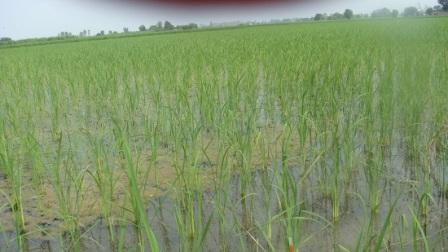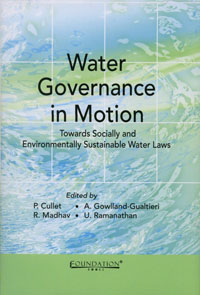Conservation - Reducing Water Usage
Water conservation - A viable option to improve water availability - Solution Exchange paper
Posted on 11 Dec, 2010 12:16 PMThis paper from the recommended documentation section of the Solution Exchange for the Water Community Discussion Summary on the preparation of the strategic plan for rural drinking water by the Department of Drinking Water Supply, Ministry of Rural Development, is directed at stakeholders, planners, managers and consumers.
The paper argues on the importance of water conservation in the context of the increasing water shortages that the country has been facing in recent years because of expansion of irrigated areas and rapid industrialisation.
The article argues that water conservation practices need to be encouraged and improved through research, effective regulations, information dissemination and incentives to the end user and more emphasis needs to be placed on adequate coverage, quality monitoring and collection of field level data.
Peer Water Exchange (PWX) receives 2010 Intel Environment Award
Posted on 29 Nov, 2010 04:40 PM
The Peer Water Exchange (PWX) was awarded the 2010 Intel Environment Award today. PWX, a project of Blue Planet Network, is a combination of process, technology platform, and people designed to unlock the global capacity and creativity of individuals, philanthropies, businesses and implementers to solve the global safe drinking water and sanitation crises.

Direct seeding of rice A simple solution to India s water crisis?
Posted on 26 Nov, 2010 11:57 AMIn partnership with the Columbia Water Center, researchers from Punjab Agricultural University have initiated a multi-year project to implement and field-test diverse water-saving technologies, practices and policies aimed at reducing agricultural water use in the state of Punjab, particularly among rice farmers. In last year’s trial, the most successful project involved the installation of inexpensive tensiometers in the fields of over 500 farmers, yielding water savings of 30-35 percent.
Concurrently with the tensiometer trials, the team also recruited a smaller number of farmers to adopt a different way of cultivating rice altogether: Direct seeding of rice.
In traditional rice cultivation, rice is sprouted in a nursery; sprouted seedlings are then transplanted into standing water. With direct seeding, rice seed is sown and sprouted directly into the field, eliminating the laborious process of planting seedlings by hand and greatly reducing the crop’s water requirements.
 Conventional rice production requires standing water
Conventional rice production requires standing water
News roundup (16-22 November 2010)
Posted on 24 Nov, 2010 10:07 PMSanitation/Wastewater
- India tops the list of nations lacking toilets
- India hunts for a Rural Toilet Design, 1000 Euros up for grabs
- 82% of rural India deprived of three basic necessities of life — tapped drinking water, electricity connection and sanitation
- There are 700 million cell phone connections in India, but only half this number of Indians have access to private toilets, says a UN study
Water governance in motion: Towards socially and environmentally sustainable water laws
Posted on 18 Nov, 2010 10:48 AM

Water Governance in Motion: Towards Socially and Environmentally Sustainable Water Laws focuses on the work undertaken by International Environmental Law Research Centre IELRC on water law reforms in India. It seeks to provide a broader understanding of the conceptual framework informing existing water law and ongoing reforms.
Watershed development in India: Biophysical and societal impacts - Research paper from Environ Dev Sustain journal
Posted on 15 Nov, 2010 11:12 PMThe paper argues that watershed management has to be fluid to take into consideration new realities like change in flow conditions, external realities like unintended impacts and the need to maintain minimum downstream flows for environmental and other purposes.
Policies and laws related to water bodies, water pollution and regulation - A collection
Posted on 13 Nov, 2010 01:00 AMIndia Water Portal has recently uploaded a set of important policies and laws. This collection pertains to water bodies, water pollution and regulation and more.
Policies related to conservation of water bodies
Heavy rains, cyclones and floods affect the life of millions; News Roundup (1-7 November 2010)
Posted on 09 Nov, 2010 08:09 PMRecent news indicates extensive reports on the threat and destruction unleashed by cyclone Jal in the three states of Andhra Pradesh, Karnataka and Tamil Nadu, with the states of Andhra Pradesh and Karnataka being affected the most. Cyclone Jal has led to heavy rainfall in both these states leading to floods and a heavy death toll in the coastal districts of both the states, besides reports of destruction of agricultural produce in the state of Karnataka.
South India
Andhra Pradesh
- Administration on high alert with the threat of cyclone Jal approaching the Andhra Pradesh coastline
- Cyclone 'Jal' claims lives in Andhra Pradesh
- Cyclone 'Jal' claims five lives in Andhra Pradesh
- Cyclone threat in Andhra, rains kill 20
- Andhra rains cause havoc, death toll rises to 25
- Rain claims 4 lives in Vizag, 2 in East Godavari
- Rain fury continues in Andhra Pradesh's coastal districts
- Heavy rains wreak havoc in coastal Andhra Pradesh
NABARD Consultancy Services is looking for Consultants at Watershed Projects
Posted on 03 Nov, 2010 02:09 PMContent and Image Courtesy: NABARD Consultancy Services
NABCONS is providing consultancy services to NABARD for implementing watershed projects in Rajasthan, Gujarat and Andhra Pradesh. The operational responsibility of the programme implementation rests with the Programme Management Unit (PMU), established especially for implementing the projects at Dahod (Gujarat), Udaipur (Rajasthan), Warangal, Sangareddy and Ongole (Andhra Pradesh).
News roundup (22 - 31 October 2010) :" India: Land of many cell phones, but fewer toilets"
Posted on 03 Nov, 2010 08:50 AMWastewater/Sanitation





